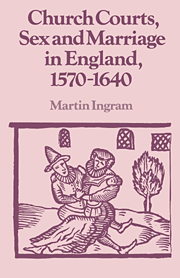Book contents
- Frontmatter
- Contents
- List of tables
- List of maps
- Preface
- Conventions and abbreviations
- Introduction
- PART 1 THE LEGAL AND SOCIAL BACKGROUND
- 1 The structure of ecclesiastical justice
- 2 Economic and social structures
- 3 Religion and the people
- 4 Sex and marriage: laws, ideals and popular practice
- PART 2 SEX AND MARRIAGE: THE PATTERN OF PROSECUTIONS
- PART 3 CHURCH COURTS AND SOCIETY
- Bibliography
- Index
- Past and Present Publications
4 - Sex and marriage: laws, ideals and popular practice
Published online by Cambridge University Press: 24 September 2009
- Frontmatter
- Contents
- List of tables
- List of maps
- Preface
- Conventions and abbreviations
- Introduction
- PART 1 THE LEGAL AND SOCIAL BACKGROUND
- 1 The structure of ecclesiastical justice
- 2 Economic and social structures
- 3 Religion and the people
- 4 Sex and marriage: laws, ideals and popular practice
- PART 2 SEX AND MARRIAGE: THE PATTERN OF PROSECUTIONS
- PART 3 CHURCH COURTS AND SOCIETY
- Bibliography
- Index
- Past and Present Publications
Summary
In Elizabethan and early Stuart England, marriage and sexual morality were of more central social and political concern than they are today. Then as now, the family based on the conjugal couple was the primary matrix of procreation and of the socialisation – in contemporary terms, the ‘education’ – of the young. To a greater extent than at present, the family household was important as a unit of production and consumption, as a vehicle for the accumulation and transmission of property, and as the fundamental institution of social order and political authority. Tudor and Stuart philosophy regarded the rule or ‘government’ of the householder over his wife, children and servants as analogous to that of the prince over his subjects: royal and patriarchal authority were mutually validating reflections or natural manifestations of a divinely ordered hierarchy.
It followed that the decision to marry and establish a new household was conventionally seen as a matter which concerned not just the couple themselves but in some measure also their existing families and members of the wider society. Moreover the upholding of the marriage bond, once established, was a major social principle. Extramarital sexual activity of whatever kind was in social theory abhorred as hateful to God and a threat to the well-being of the commonwealth, and hence subject to legal penalty. Contrariwise, sexual ‘honesty’ and the status of married householder were important touchstones of respectability and stability. ‘Necessary it is’, observed the moralist William Gouge, ‘that good order be first set in families: for as they were before other polities, so they are somewhat the more necessary: and good members of a family are like to make good members of church and commonwealth.’
- Type
- Chapter
- Information
- Church Courts, Sex and Marriage in England, 1570–1640 , pp. 125 - 168Publisher: Cambridge University PressPrint publication year: 1988



